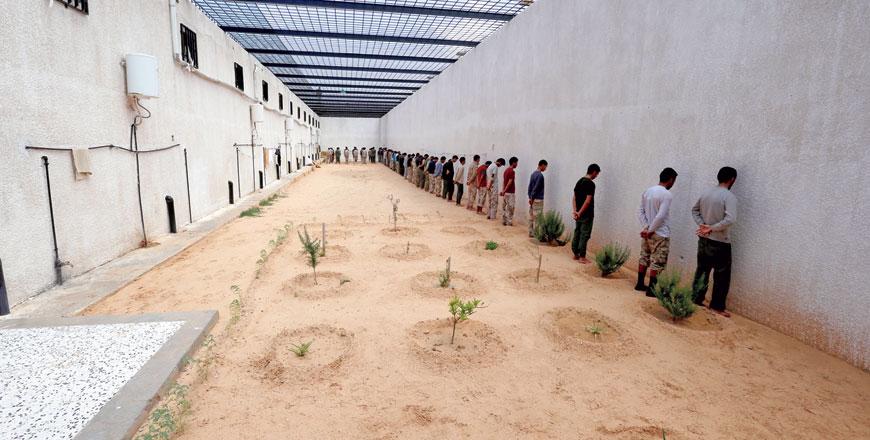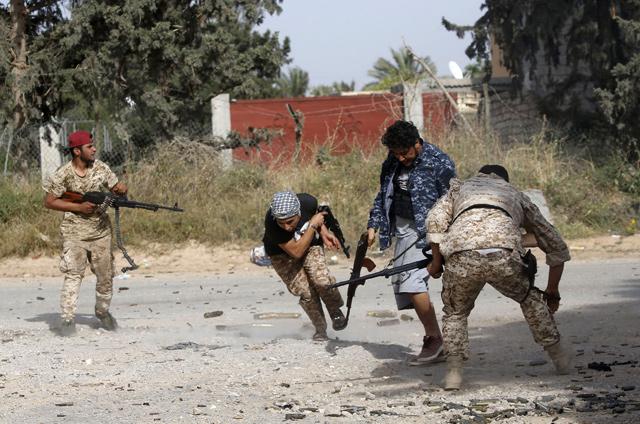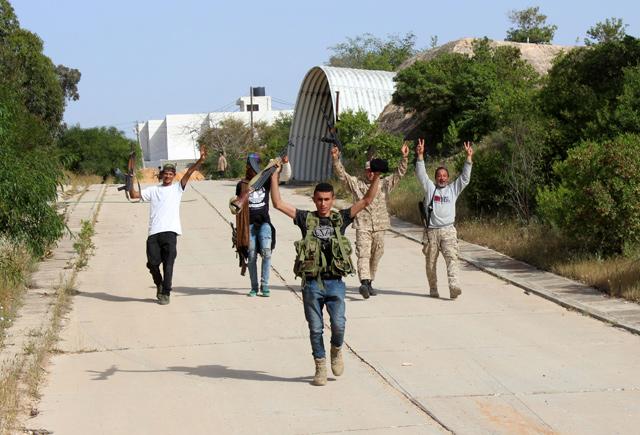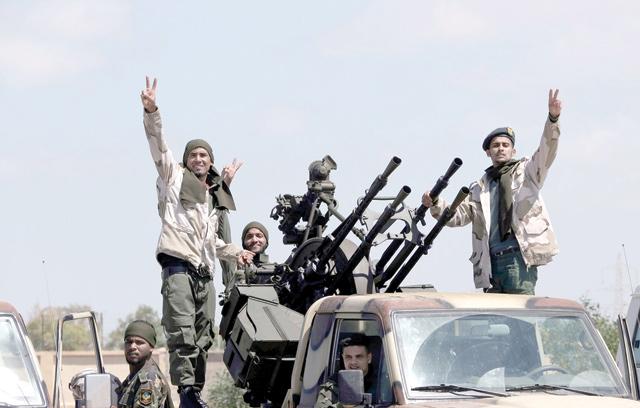You are here
UN chief urges ceasefire to avert 'bloody battle' for Tripoli
By AFP - Apr 12,2019 - Last updated at Apr 12,2019

Troops from eastern Libyan forces stand against a wall, after being captured by forces loyal to the Libyan internationally recognised government in Ain Zara, south of Tripoli, Libya, on Thursday (Reuters photo)
TRIPOLI — The UN chief warned Libya is on the brink of "a very dangerous situation" as forces loyal to the internationally recognised government and a rival commander battle for control of the capital.
Thousands of people have fled heavy fighting on the outskirts of Tripoli that has left dozens dead and prompted mounting global alarm.
UN chief Antonio Guterres on Wednesday appealed for a halt to hostilities to prevent the situation spiralling out of control.
"It's still time to stop," he told reporters after briefing the UN Security Council in a closed session in New York.
"It's still time for a ceasefire to take place, for a cessation of hostilities to take place, and to avoid the worst, which would be a dramatic, bloody battle for Tripoli."
Nearly a week of fighting on the city's doorstep has already killed 56 people and wounded 266, the World Health Organisation said.
"Thousands of people have fled their homes, while others are trapped in conflict areas. Hospitals inside and outside [Tripoli] are receiving daily casualties," it said.
The UN chief was in Libya when forces loyal to military strongman Khalifa Haftar last week launched an offensive to capture the capital, which is controlled by a UN-backed government and an array of militias.
Haftar backs a rival administration based in eastern Libya that refuses to recognise the authority of the Government of National Accord (GNA) led by Fayez Sarraj.
The Security Council met for more than two hours behind closed doors to consider how to address the fresh fighting that has derailed efforts to end instability that has been exploited by terrorists and people-smugglers.
The European Union's foreign policy chief, Federica Mogherini, said the situation in Libya was "increasingly worrying".
She called for the "full implementation of the humanitarian truce" and the "return to the political negotiations and the political track".
The United Nations postponed a national conference that was to open on Sunday to draw up a roadmap to elections, meant to turn the page on years of turmoil since the NATO-backed overthrow of dictator Muammar Qadhafi in 2011.
Heavy clashes shook Ain Zara, a town dotted with farms on the south-eastern outskirts of Tripoli where pro-GNA fighters managed to reverse an advance by Haftar’s forces.
On the town’s main street, lined with shops and houses, a sand barrier erected by pro-GNA forces separated the two camps.
“Today, the criminals of Haftar’s group have advanced, but we destroyed a tank and two armoured vehicles,” said a pro-GNA fighter who gave his name as Youssef.
“The situation is good now,” he said.
Behind him, artillery fire stirred up a cloud of sand as the sound of machine guns and anti-aircraft guns rang out.
Suddenly a shell sliced through the air and hit a nearby house.
“You see, he [Haftar] wants to destroy our houses and all of Tripoli,” one of the fighters shouted.
The GNA took journalists to a prison in the area, where director Ayad Enjem said “75 combatants” of Haftar’s self-styled Libyan National Army had been detained since Friday.
“Several are younger than 16 years old” said Enjem, as representatives from a UN agency interviewed the prisoners.
One detainee told AFP he was 16 and had been recruited recently in Sabratha, to the west of Tripoli.
‘Cat and mouse’
Haftar’s forces, which control swathes of the country’s east, said on Wednesday they had seized a barracks in the Aziziya area around 50 kilometres south of Tripoli after “ferocious clashes”.
They said several fighters loyal to the UN-backed government had been detained and their weapons seized.
“For the moment, it’s still a game of cat and mouse,” a commander from a pro-GNA group said on Wednesday.
“We’re still organising ourselves. The war hasn’t truly started,” he told AFP in Ain Zara.
Haftar’s forces appear to be advancing on two fronts, from the south and southeast of Tripoli, while coastal roads to the east and west of the city are defended by fighters loyal to the GNA.
The United Arab Emirates, Egypt, Saudi Arabia and Russia are key allies of Haftar, a former Qadhafi military chief who has emerged as a major player in Libya’s political struggle.
NATO chief Jens Stoltenberg said on Wednesday the alliance was “deeply concerned by the situation in Libya”.
“The current military operation and advance on Tripoli are increasing the suffering of the Libyan people and putting civilian lives at risk,” he said.
Although casualties remain limited so far, the International Crisis Group warned further escalation “could precipitate a humanitarian disaster”.
“If unleashed, a full-fledged offensive could become a proxy war between regional powers and cause innumerable casualties as well as immense devastation,” the think tank said.
Related Articles
TRIPOLI — Forces backing Libya's unity government battled to push back an offensive by strongman Khalifa Haftar on Sunday as his troops appr
TRIPOLI — Forces loyal to Libya's unity government announced Saturday a counterattack against military strongman Khalifa Haftar's fighters,
TRIPOLI — The conflict shaking Libya escalated Sunday as forces of strongman Khalifa Haftar launched an air strike on a suburb of Tripoli an



















